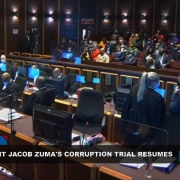|
Getting your Trinity Audio player ready...
|
 Dear Corruption Watch,
Dear Corruption Watch,
In his testimony before the Seriti Commission on the arms deal, former president Mbeki suggested that a ‘facilitation commission’ is not a bribe. What is the legal distinction?
Yours
Concerned Middle-Man
Dear Concerned Middle-Man
Former president Mbeki's testimony decidedly records that the payment of a commission, in and of itself, is not a bribe. As the former president pointed out, commission payments (which are fees based on a percentage of sales) are generally a feature of normal business practice. As such, the payment of commission to an individual mandated to carry out a function or conclude a particular business arrangement (the proverbial middle man) is not, without more, a bribe.
That said, the more noteworthy observation captured in the testimony is that commission payments may be used as a "camouflage for bribes and kickbacks". It was intimated that this was prevalent in the arms industry. In this context, the former president suggested that the act of bribery would lie in the improper payment made to the ultimate decision-maker, as opposed to the facilitator to whom a commission has been paid (even if the facilitator was engaged to carry out an act of bribery).
In this regard, the Prevention and Combating of Corrupt Activities Act, 2004 (Precca) is clear. Where a person accepts a gratification – which would include payment of a commission – in order to influence another person to act in an improper manner, that person would be guilty of an offence under Precca. In other words:
- Acceptance by the middle man of a legitimate commission for services rendered does not, in itself, amount to a corrupt act;
- If a commission is paid to the middle man in order to ensure that the ultimate decision-maker is improperly influenced, it is not only the payment to the ultimate decision-maker that constitutes a corrupt activity but also the acceptance of a commission.
In short, it is incorrect to state that the payment and receipt of a facilitation commission is not a bribe in all cases. Where the payment of the commission is intended to facilitate the improper influence of an ultimate decision-maker, receipt of a commission for such purpose is as much an offence under Precca as the improper payment to the ultimate decision-maker itself.
As an aside and separate from the question of facilitation commissions described in the context of the Seriti inquiry, it is interesting to note that facilitation payments – or expediting payments – are not outlawed in the US. These payments are permissible to expedite routine governmental actions such as the processing of a visa or the supplying of utilities. Facilitation payments would nevertheless amount to a corrupt activity in South African law. Although these payments are merely intended to expedite routine acts to which citizens are already entitled, Precca does not contain any exceptions that allow for them. This may be because facilitation payments, like commission payments, may often be used as a disguise for bribes.
As such and in keeping with South African law, facilitation payments and facilitation commissions, aimed at influencing ultimate decision-makers, should be avoided at all costs.
• This article was first published in Sunday Times: Business Times








